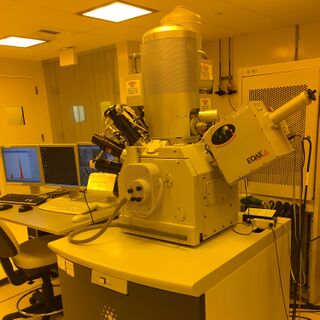Nova 200 NanoLab: SEM & EDS: Difference between revisions
Jump to navigation
Jump to search
| Line 63: | Line 63: | ||
* [https://caltech.box.com/s/n0abqy5z1e9a8hbyf38qybxu86sqz3vb Scripting – AutoScript Language Manual (year 2005 Technical Note: less complete, still useful)] | * [https://caltech.box.com/s/n0abqy5z1e9a8hbyf38qybxu86sqz3vb Scripting – AutoScript Language Manual (year 2005 Technical Note: less complete, still useful)] | ||
* [https://caltech.box.com/s/tlqgvtkkiahi261megm087i61gqlfzrc Scripting – RunScript Manual] | * [https://caltech.box.com/s/tlqgvtkkiahi261megm087i61gqlfzrc Scripting – RunScript Manual] | ||
* [https://caltech.box.com/s/36j0n01ig7f757kvkiebvqjqj0el2yvp EDAX Genesis EDS & WDS Operation Manual (replaced - historic reference)] | |||
===== Simulation Software ===== | ===== Simulation Software ===== | ||
Revision as of 18:18, 8 February 2021
|
Description
The Nova 200 is the KNI's highest-resolution field-emission gun (FEG) analytical scanning electron microscope (SEM), equipped with an immersion lens for imaging sub-10 nm features and energy dispersive spectroscopy (EDS) for compositional analysis. It is also outfitted with a gallium focused ion beam (Ga-FIB) column, which is currently not operational because the Nova 600 NanoLab and ORION NanoFab together meet the KNI's Ga-FIB demand; Ga-FIB could be reactivated on the Nova 200 in the future. See a full list of training and educational resources for this instrument below.
SEM Applications
- Ultra-High-Resolution Imaging (Immersion Mode aka UHR Mode)
- High-Resolution Imaging (Field-Free Mode aka Normal Mode)
- Secondary Electron (SE) imaging with an Everhart-Thornley Detector (ETD) & Through-the-Lens Detector (TLD)
- Backscattered Electron (BSE) imaging with a TLD
- Tungsten deposition via Gas Injection System (GIS)
- Automated imaging with RunScript program & AutoScript language
EDS Applications
- Spectrum acquisition for quantitative compositional analysis
- Linescan acquisition for 1D spatial compositional analysis
- Map acquisition for 2D spatial compositional analysis
Resources
Equipment Data
SOPs & Troubleshooting
- SEM SOPs (Short Version | Long Version)
- EDS SOPs (Short Version | Long Version)
- Troubleshooting Guide
Video Tutorials
- Getting Started | Basic SEM Alignment
- Astigmatism Correction (Details | On Right-Angle Features | Stigmator Alignment)
- Eucentric Height: What it means, When to use it & How to get there
- Adjusting TLD Voltage to Capture SE vs. BSE Signal
Graphical Handouts
Presentations
- Scanning Electron Microscopy: Principles, Techniques & Applications
- Gallium Focused Ion Beam Microscopy: Principles, Techniques & Applications
Manufacturer Manuals
- Nova NanoLab Operation Manual
- Bruker Quantax EDS Operation Manual
- Gas Injection Systems – Deposition of Tungsten (Technical Note)
- Gas Injection Systems – Delineation Etch for SiO2 (Technical Note)
- Gas Injection Systems – Selective Carbon Etching (Technical Note)
- Gas Injection Systems – Beam Chemistries Presentation
- Scripting – AutoScript Language Manual (year 2000 Technical Note: most complete)
- Scripting – AutoScript Language Manual (year 2005 Technical Note: less complete, still useful)
- Scripting – RunScript Manual
- EDAX Genesis EDS & WDS Operation Manual (replaced - historic reference)
Simulation Software
- CASINO Electron Beam Simulation Software – simulate e-beam/specimen interactions (very useful for EDS & WDS)
- The Stopping & Range of Ions in Matter (SRIM) – simulate i-beam/specimen interactions
Calibrate Measurements with NIST Standard
- The KNI has a NIST-traceable standard against which SEM measurements can be compared. See Slides 54-55 of the SEM Presentation for details. Ask staff for help finding and using the standard in the lab.
Sample Preparation
- Use the Carbon Evaporator to make non-conductive samples conductive by applying 2-10 nm of evaporated carbon.
- Use the O2/Ar Plasma Cleaner to remove hydrocarbons from the sample surface to avoid creating dark contamination spots on your features while imaging them.
Order Your Own Stubs
- Stubs used for mounting specimens are considered a personal, consumable item in the KNI. There are some old stubs at each SEM, yet you should buy your own so that you can keep them clean and available to you. There are many stub geometries and configurations, some of which will be right for you to purchase and keep with your other cleanroom items.
- Buy stubs with copper clips (recommended for most devices, especially those with non-conductive substrates)
- Buy stubs without copper clips (OK for devices with conductive substrates)
Guide to Choosing KNI SEMs & FIBs
Specifications
Manufacturer Specifications
- Nova 200 NanoLab Data Sheet (not all parameters apply to our instrument, see below for details specific to the KNI's Nova 200)
SEM Specifications
- Minimum Feature Size Resolved in Immersion Mode: ~5 nm
- Voltage Range: 0.2 to 30.0 kV
- Current Range: ~10 pA to 20 nA
- Apertures: 30 μm, 40 μm, 50 μm, 100 μm
- Eucentric Height: ~4.8 mm working distance (WD)
- Stage Range: ±25 mm X & Y travel, 50 mm Z travel, -12 to 58° tilt, 360° rotation
- ETD Grid Bias Range: -150 to 300 V
- TLD Bias Range: -100 to 150 V
- Ultimate Vacuum: 5e-6 mbar
Related Instrumentation in the KNI
Scanning Electron Microscopes (SEMs)
- Nova 600 NanoLab: SEM, Ga-FIB, GIS & Omniprobe
- Nova 200 NanoLab: SEM & EDS
- Sirion: SEM & EDS
- Quanta 200F: SEM, ESEM, Lithography & Probe Station
Focused Ion Beam (FIB) Systems
Sample Preparation for Microscopy
- Carbon Evaporator (Leica EM ACE600) to make samples conductive
- Oxygen & Argon Plasma Cleaner (Tergeo Plus ICP- & CCP-RIE) to remove hydrocarbons from surface
Transmission Electron Microscopes
- Tecnai TF-30: TEM, STEM, EDS & HAADF (50-300 kV)
- Tecnai TF-20: TEM, STEM, EDS, EELS, EFTEM & Lithography (40-200 kV)
